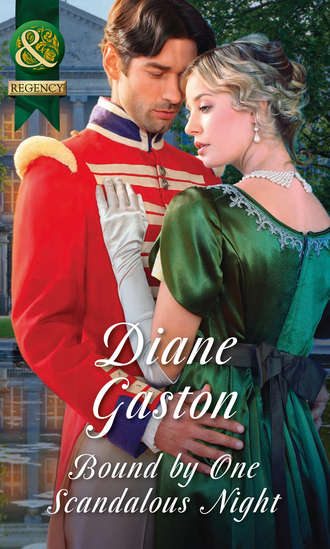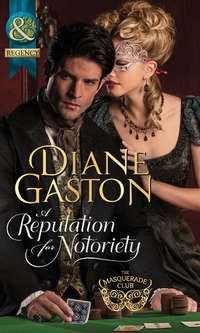
Полная версия
Bound By One Scandalous Night
But this was not the time to discuss Lady Summerfield.
‘There are fortunes to be made on the Continent, now that the war is over,’ he said instead. And Count von Osten had a talent for finding them.
‘You sound like Papa,’ Tess accused.
Their late father had always chased an easy fortune, finding instead only debts and failure. When his half-sister Lorene sent him money to purchase a captaincy, Edmund had been surprised there had been any money left to inherit. While Edmund recuperated in Brussels, he used that money, not to purchase an advancement in the army, but to make the very sort of investment his father might have made. Except, unlike his father, Edmund made good profits from taking the risk. Now that he’d sold his lieutenancy, he had even more money to invest.
‘I’ll do well enough, Tess,’ he assured her. ‘Besides, I only have me to worry over.’ Not a wife, three daughters and a bastard son, like their father.
‘No more talk of money,’ her husband said cheerfully.
‘Then tell me of Lorene and Genna,’ Edmund said, glad to change the subject. ‘Are they in London, too?’
Their sister Lorene had married a very old man, a reclusive earl who lived near their village in Lincolnshire. She’d married him for his money, which seemed unlike her. Edmund had never met the man.
‘Lord Tinmore has retired to the country.’ Glenville’s voice rang with contempt. ‘He has filled Tinmore Hall with guests who are invited for the bird shooting.’
‘Guests?’ Edmund said. ‘I thought he was an old recluse. Was that not what was said of him when we were growing up?’
‘He probably has invited his eligible gentlemen friends in an effort to get Genna married off,’ Tess responded. ‘He is eager to be rid of her, I think.’
‘How old is Genna?’ Edmund asked. ‘Is she not too young?’ His eyes darted to Amelie again. How old was she? he wondered. Had she been too young? He’d not given that a thought that fateful night.
‘She is nineteen now.’ Tess rolled her eyes. ‘Plenty old enough, but she professes to be against marriage. She sometimes vows never to marry, but it is unlikely Tinmore will allow her that choice.’
Edmund was alarmed. ‘Surely he will not force her!’
Tess exchanged a look with her husband, who answered, ‘I fear Tinmore is capable of almost anything.’
‘What of Lorene?’ Edmund asked. Could he take care of both Lorene and Genna if it became necessary? ‘Does he treat her ill?’
Tess shook her head. ‘He is indulgent of Lorene as far as I can surmise. She wants for nothing, but he wants Lorene all to himself, not shared with her sisters.’
Edmund curled his fingers into a fist. ‘You will tell me if he mistreats either of them.’
‘We will not let them be mistreated,’ Glenville said emphatically.
The butler entered the room to announce that dinner was served. Tess took Glenville’s arm. There was nothing for Edmund to do but offer to escort Amelie. Her graceful fingers wrapped around his offered arm.
‘How are you, Amelie?’ he asked in a lowered voice as they trailed behind Tess and Glenville.
She raised her blue eyes to his for a moment but quickly averted them again. ‘I am well enough, I suppose.’
She appeared altered, though, not full of sparkle and happiness like when he first met her in Brussels. She was different than when he’d made love to her, as well. She seemed...worried.
In the dining room she was seated next to him, and he was aware the entire time of her closeness. He found himself wanting to see the expressions on her face to gauge how she was feeling.
There were so many questions he wished to ask her. Was she ill? Was she still affected by Fowler’s behaviour in Brussels? Did she ever think of the night they’d spent together? If so, did she remember it as he did? As a transforming experience? Or did she feel regret, remorse, or worst of all, shame? Should he have left her at the hotel door?
He hardly attended to the conversation at the table, hardly knew what he’d said to anyone. He’d talked about his investments, his plans to travel to wherever a fortune could be made. He and Glenville debated what countries that might be and also what the end of the war might mean to the economies of Britain, France and the rest of the Continent. If only he could remember what they concluded. A part of his mind had fixed on Amelie and would not let go.
* * *
Amelie made a show of eating, although she mostly pushed food around her plate. She’d not had an appetite of late. Would he notice?
She’d forgotten how handsome he was. Out of uniform in a beautifully tailored coat and trousers that showed his muscular legs, he was an impressive sight.
Was he glad to see her? She could not tell. There was no way to talk to him alone, and she dared not reveal that she knew him a great deal better than Marc or Tess could ever imagine. Perhaps his reticence to even look at her was to help keep their secret. She hoped so. She hoped it was not that he disliked encountering her again.
* * *
After dinner he and Marc did not linger over brandy. Instead they all returned to the drawing room for more conversation.
She’d thought she might never see Edmund again, thought he’d return to the army and be sent somewhere far away, but here he was and now she needed to make a decision. To speak to him now, to tell him of her—situation—or to have him find out later, perhaps in a letter from Tess.
It had bothered her greatly that he would find out after the fact and not hear it from her own lips.
He was here now, though. This might be her only chance.
But how to speak to him alone?
She could not think of any excuse to do so. He seemed not to pay her much mind, so would likely miss any hint she could try to send him to let him know she wanted to see him alone, with no one around. Just her and Edmund.
Eventually she excused herself, saying she was going to bed. Instead she put on her cloak and sneaked outside. She’d stand in the chilly September air until he walked out the door.
She waited in the stairs that led from the street to the servants’ entrance, hoping none of them opened the door and caught her there. The wind and damp seemed to find their way to her hiding place, making the minutes ticking by move even more slowly. How easy it would be to simply turn around and re-enter the house and tell herself she’d tried. He might stay for hours, might he not? Could she wait so long? Her feet, still in her dinner slippers, felt like ice, and her ungloved fingers trembled as they sought warmth in the recesses of her cloak. How long had it been? She tried to listen for the chiming of clocks, but all she could hear was the wind, an occasional carriage rumbling by or the chattering of her teeth.
Finally she heard the front door open, and she emerged from her hiding place, stepping into the light cast by the rush lamps.
He turned at the sound of her footsteps. ‘Amelie! What are you doing out here?’
‘I—I wanted to see you alone,’ she managed.
He took hold of her arm and walked her back into the darkness. ‘Tell me truthfully, Amelie. How do you fare? Your brother said you were not doing well. Are you ill?’
‘I’m not ill,’ she said.
‘Do not tell me you are still affected by Fowler.’
She almost laughed. ‘Certainly not.’
‘Then is it what transpired between us?’ He sounded distressed. ‘If so, I am so sincerely sorry—’
‘It is not that,’ she broke in. ‘At least not precisely.’
‘You must not allow that night to change you. You are still beautiful. More beautiful, in fact. There is no reason you cannot marry—’
She cut him off again. ‘There is a reason, Edmund! A very important reason. That is why I contrived to see you alone. There is something I must tell you.’
‘What is it?’ His voice was tense. She could not clearly see his face.
Her heart pounded painfully in her chest. She took a deep breath and said words she’d never until this moment spoken aloud.
‘I am going to have a baby.’
Chapter Five
The air was knocked out of Edmund’s chest.
A baby.
He knew efforts to prevent a baby were anything but reliable, but he’d ignored that. He’d allowed his passion to overtake him.
‘You might wish to ask if the child is yours,’ she said stiffly. ‘I assure you it is. And I am certain I am carrying a child. I have not had my courses since—since that night. I am sick every morning, fatigued all day, and I feel...altered. No one knows. Of course, they will discover it soon enough.’
‘A baby,’ he whispered.
She lifted her chin. ‘Do not fear. No one knows of our meeting that night, and I will say nothing. You will be safe from blame. I am perfectly aware I was the cause of this.’
‘No.’ He knew who was to blame.
She took a breath. ‘Well. There it is. That is why I wanted to see you alone.’
She turned to leave, but he seized her arm. ‘Do not tell me such a thing and then leave.’
‘There is no more to say,’ she told him. ‘I ask nothing of you.’
‘Nothing of me?’ he repeated. She wanted him to have no part of it?
Her eyes flashed. ‘I’ll not get rid of it, if that is what you are about to say.’
He still gripped her arm. ‘I was not about to say that.’ He was about to ask her why she wanted him to have no part in a child they created together, why she did not see what they must do, even if she disliked it.
‘I do not yet know what I will do,’ she went on. ‘Perhaps my parents will send me to France. I have relatives there. I’ve never met them, but perhaps they will be accommodating.’
He released her and paced in front of her, talking more to himself than to her. ‘You would give the baby away? Or pay someone to care for it?’ She preferred that?
She shrugged. ‘I do not want to do either of those things, but I cannot imagine my parents allowing me to keep the child. Think of the scandal I would bring on them.’
He came closer. ‘There will be scandal, no matter what.’ But he knew the right thing to do.
‘You need not worry about that,’ she said.
He need not worry? He’d been born to scandal. He never worried about what people thought of him.
Except for one person. He cared what Amelie thought of him, and it seemed she wanted nothing to do with him.
He was so close to her now his body flared in response to her, betraying him as it had that night in Brussels. He again remembered how it felt to lie next to her, how it felt to be inside her.
It wounded him that she did not want him to take responsibility for the child, but what did that matter? She must see there could be no other way.
He began pacing again. ‘I can provide for the child.’
‘Money is no issue,’ she said. ‘I have an inheritance, and my father can easily pay.’
‘I am not speaking of money.’ He was speaking of what must be done.
She cleared her throat. ‘I have no more to say. I—I thought it my duty to tell you. I truly ask nothing of you—’
Before he could protest, before he could tell her what he thought they must do, no matter how distasteful to her, she turned and rushed down the servants’ stairs and into the house.
She left him standing on the pavement. Alone.
* * *
Amelie closed the door and ran up the servant’s staircase to her bedchamber, fighting tears.
There. She told him. She’d done her duty to him and assured him she would not use the child against him. No one would ever know it was Edmund’s child; no one but her. At least she could console herself that he would be free to live his life, to build his fortune, to have his adventure, like he’d spoken of at dinner with so much energy and passion. She would do nothing to stop him, nothing to spoil his happiness.
She tore off her cloak and flung herself on her bed.
If only he had not looked so handsome. If only he had yelled at her for being so foolish as to allow a baby to be conceived. If only he had not roused in her those wanton feelings. Goodness! Merely having his hands gripping her arms made her recall how those hands felt against her naked flesh. Even in her predicament, she’d yearned to couple with him again, to feel that intense ecstasy that he created in her.
Well-bred young ladies did not feel such things. Well-bred ladies did not get themselves with child. They married for social advantage for their families and procreated to beget heirs, not because they craved a man’s touch and the thrill he could create. This was her downfall, certainly. If she had not been so wanton, she would not be in this fix, but she was determined she would not ruin his life along with her own.
It was some consolation that she’d assured him of that fact.
* * *
Edmund returned to the Grosvenor Street town house at ten the next morning. As he announced himself to the footman attending the door, Glenville walked down the stairs.
‘Edmund!’ Glenville was, of course, surprised to see him. ‘You are back so soon. To what do we owe this pleasure?’
Edmund had come to call upon Amelie, but to say so now would only cause Glenville to ask questions. He might as well provide the answers first.
‘A moment of your time?’ he asked.
‘Certainly,’ Glenville said, still sounding puzzled. ‘Come to the library. Would you like some refreshment?’
‘No,’ Edmund handed his hat and gloves to the footman. ‘Just a word with you.’
Glenville gestured for Edmund to follow him. The library was behind the drawing room, in the back of the house. If the drawing room was designed to impress and entertain, the library was intended for comfort and solitude. It was lined with books and filled with comfortable chairs.
Glenville lowered himself into one of them. ‘Please have a seat.’
Edmund remained standing and debated how to start.
Might as well charge ahead. ‘I came to ask for something which, no doubt, you will be unprepared to hear.’
Glenville’s brows rose.
‘Actually, it is not something I think you can grant, but I owe you the courtesy of hearing it from me.’
‘And this is?’ Glenville asked.
‘I would like to pay my addresses to your sister.’
Glenville’s eyes widened. ‘Pay addresses?’
‘Court her,’ Edmund went on. ‘Marry her.’
Glenville shook his head in bewilderment. ‘But you do not know her!’
Edmund knew her better than Glenville could guess, but he could not explain. He’d promised to never speak of that night to anyone.
‘It is true we have not been in each other’s company—’ he began.
Glenville cut him off. ‘Not above twice! Once in Brussels and last night.’
Three times, actually. ‘I would still like to speak to her.’
Glenville stood again and walked over to a far corner of the room. He turned. ‘Do not get me wrong, Edmund. I think you are a fine man. I am proud to be connected to you by marriage, but I do not think this will work.’ He paused. ‘Your suit is—is just not...’ His voice faded.
‘Not acceptable because I am a bastard?’ Edmund finished for him.
Glenville lifted his hands. ‘That is of no consequence to me, but I cannot see my father giving his permission.’
‘I will have to speak to him, of course,’ Edmund said. ‘But first I would like to speak to your sister.’
Glenville frowned. ‘Are you thinking she will accept you, because her betrothal to Fowler fell apart? She is still young. My parents will expect other suitors.’
Better than he, a bastard with uncertain prospects, though perhaps not once the pregnancy was discovered. ‘I am well aware that she might deserve a better suitor than me.’
Glenville shook his head. ‘I still cannot wrap my mind around this. What makes you think she will accept you? She spoke hardly two words to you last night.’ He frowned and peered suspiciously at Edmund. ‘Are you experiencing financial difficulties? Because Tess and I would be glad to help you—’
Edmund straightened. ‘I am not after her dowry! Believe me, money does not enter in this at all.’
Glenville sputtered. ‘This is hardly making any sense!’
‘What is your objection to me speaking to her?’ Edmund pressed on. Even a decent gentleman, like Glenville, could not help but wish for a better man than Edmund for his sister’s husband, apparently. Edmund was disappointed, but not surprised. ‘I am perfectly willing to withdraw if she should refuse me.’
Glenville’s expression, however, seemed filled with kindness. ‘I do not object to you speaking to Amelie, Edmund. I do not object to you at all. I am merely taken aback.’
‘That is all I ask,’ Edmund said. ‘To speak to her.’
‘By all means. And I wish you well.’ Glenville walked to the door. ‘Wait here. I will send her to you.’
He left the room, and Edmund pressed his fingers against his temple. No one would think this viscount’s daughter should marry a mere bastard. Even Edmund did not think himself worthy of her. Her marriage to him would cause talk. More talk when a baby was born too soon, but this was the respectable solution, the honourable choice.
A few minutes passed before the door opened again.
Amelie walked in. ‘Edmund?’ She looked surprised and less than happy to see him. ‘What are you doing? My brother said you wanted to speak to me.’
She also looked unwell.
‘Are you ill?’ he asked, taking a step towards her.
She halted him with her hand. ‘Mornings are bad for me. Tell me what you are about, though. My brother looked uncertain. You did not say anything to him about—about—?’
About Brussels? ‘Never,’ he responded. ‘I gave my word.’
‘Well, my guess is that my brother is going to pound me with questions after you leave. Why would you wish to speak to me? Marc and Tess are going to want to know. When the truth comes out about—about me, this might make them think you were involved.’
‘I was involved,’ he said. ‘I am involved. Stop talking and listen to me.’
She clamped her mouth shut and crossed her arms over her chest.
‘You ran off last night before I could make plain to you what we must do—’
Her eyes flickered, but she did not move.
‘There is only one solution, Amelie. We must think of what is best for the child, not for you or me.’ He was not coming to the point. He took a breath. ‘We should marry. Marry me, Amelie.’
‘Marry?’ She looked shocked.
He hurried on. ‘The baby will have my name instead of no name. He or she must never know the scandal of being a bastard or of growing up not knowing who his parents really were. The child will be able to grow up respectably.’
‘You cannot truly wish to marry me!’ she cried.
He’d never dreamed it to be possible. ‘You cannot wish to marry me, but our wishes cannot matter in this. We must do this for the baby.’
‘For the baby,’ she repeated, glancing away.
He strode up to her and placed his hands on her shoulders. ‘I know what it is to grow up a bastard. It is an albatross one must carry all one’s life. It is the fact against which everything else one does is judged. I do not want that for our child. I cannot allow what I have done to so burden a child.’
‘It was my doing, Edmund,’ she said sadly. ‘You should not have to pay the consequences of what I have done.’
‘What we have done,’ he corrected. ‘I accept my part in it.’ Indeed, he knew he bore the lion’s share of the guilt. ‘But the child. He or she should not have to pay the price.’
In so many ways Edmund had been lucky. He’d not been abandoned to the streets of the Rookery. His mother had loved him. His father had acknowledged him and raised him as a gentleman, sent him to school and purchased his commission. But, even so, never, in any situation, had he been allowed to forget he was a bastard.
‘What say you, Amelie?’ he went on. ‘Will you marry me?’
* * *
Amelie glanced away, at war with herself.
The idea of it made her immediately feel safe, when before she’d been consumed with fear. To face this problem with Edmund at her side dispelled the fear.
She winced inwardly. How awful of her to think of her baby as a problem. Edmund was right that they should think of the baby, not as a problem, but as a child who would grow into adulthood. What they decided right now would affect the rest of the child’s life.
But marrying Edmund would affect his life, too. Could she rob him of his future? All his wonderful plans?
She walked over to a chair and lowered herself into it.
She lifted her gaze to him. ‘Yes, Edmund, I will marry you.’
A relieved smile crossed his face, and he sat in the chair adjacent to hers. ‘We are in agreement, then.’
‘What shall we do now?’ she said.
‘We should marry right away,’ he said. ‘I will procure a special licence.’
‘Yes, right away,’ she murmured. ‘People will still talk when the baby comes early.’
‘But not so much. All is forgiven if we are married.’ His tone was subdued.
They were both resigned to a fate neither would have chosen. They sat in silence together while the mantel clock ticked away.
‘Marc and Tess will want to know what we discussed here,’ she said finally.
‘We will talk to them together,’ he said. ‘If you desire it.’
‘Yes. I do agree.’ They might be strangers discussing how to reach a destination.
‘What do they know about that night in Brussels?’ he asked.
‘Why, nothing,’ she responded, more energy reaching her voice. ‘My family still believes I walked back to the hotel with Captain Fowler.’
‘You did not tell them he broke the engagement?’
‘There was no reason to,’ she explained. ‘Especially when he was injured. When his parents wrote that he had to withdraw from the betrothal because of his injuries, it was easy to accept it and say nothing.’
‘You were not sorry?’ Now his voice showed some emotion.
‘Not at all.’ She’d be pleased never to face Fowler again. Ever. ‘Although I was sorry he was so grievously hurt in the battle.’
‘Your brother thought I was daft to ask to court you,’ he said with some humour.
‘You told him you wished to court me? He did not say so.’ No wonder Marc had acted so strangely. She could not help but laugh. ‘He must think we are strangers!’
He smiled and her heart seemed to flip in her chest. When Marc told her Edmund was here, Amelie resolved not to think of how handsome he was, nor how skilfully and kindly he’d made love to her, but both thoughts came rushing back.
She felt the colour rise in her face and suddenly she felt awkward with him. ‘Perhaps we should speak to Marc now.’
‘Certainly.’ He stood and offered his hand.
She put her hand in his, relishing the strength of his grip and the masculine roughness of his skin, as she’d relished touching his body that night in Brussels.
That scandalous night that had changed both their lives.
They walked out of the library and into the hall, where Staines stood in attendance. ‘Mr and Mrs Glenville wish for you to go to them,’ he said.
‘Where are they?’ she asked.
‘The drawing room.’
As they walked to the drawing room door, Amelie glanced at Edmund. ‘Are you certain of this?’
‘Very certain,’ Edmund replied.
She nodded and Edmund opened the door. Marc and Tess immediately looked up and left their seats.
Tess walked up to Edmund and gave him a hug. ‘What are you about, Edmund?’ she asked at the same time.
‘Did Marc tell you why Edmund wished to see me?’ Amelie asked her.
Tess nodded. ‘Marc said... Well, it is nonsensical.’
‘I have accepted him,’ Amelie said. ‘We will marry as soon as possible.’
‘What?’ Marc’s voice grew louder.
‘You do not know each other!’ Tess cried.
Marc gripped Amelie’s arms. ‘Amelie, do not be so hasty—’
Edmund broke in. ‘I realise I am not the husband you would choose for her.’
‘I already told you it is not that,’ Marc insisted. ‘It is that you have no real acquaintance and—and our father is not likely to approve.’







